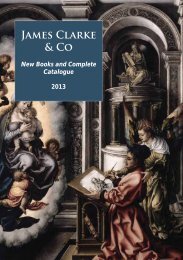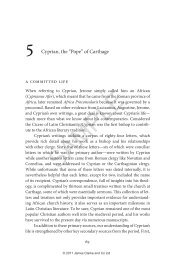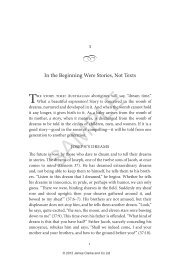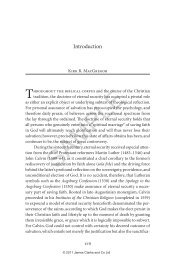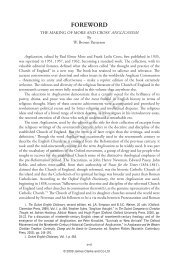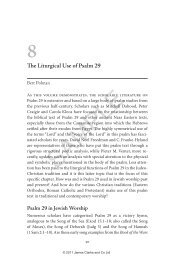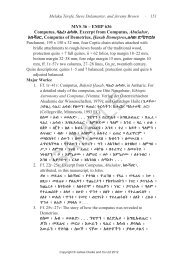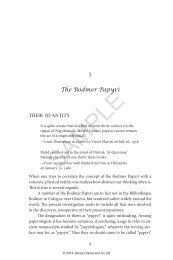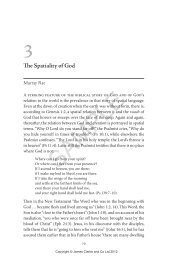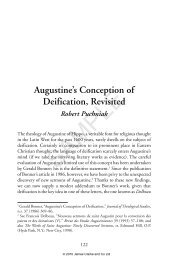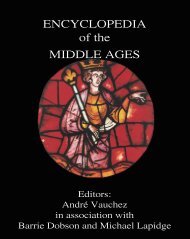Extract from Chapter 1 - James Clarke and Co Ltd
Extract from Chapter 1 - James Clarke and Co Ltd
Extract from Chapter 1 - James Clarke and Co Ltd
Create successful ePaper yourself
Turn your PDF publications into a flip-book with our unique Google optimized e-Paper software.
The Textual Words of the Analects <strong>and</strong> the Letter to the Galatians<br />
69<br />
vated in the stylized rituals <strong>and</strong> beautiful music of the sages in the past.<br />
Slingerl<strong>and</strong> correctly notes that “<strong>Co</strong>nfucius seems to have been the first<br />
to use the term dao (‘the Way’) in its full metaphysical sense. Referring<br />
literally to a physical path or road, dao also refers to a ‘way’ of doing<br />
things, <strong>and</strong> in the Analects refers to the Way—the unique moral path that<br />
should be walked by any true human being, endorsed by Heaven <strong>and</strong><br />
revealed to the early sage-kings.” 43<br />
The teaching of <strong>Co</strong>nfucius, as it advocates for the path of becoming<br />
human, provides a moral response to a fallen society “whose rulers have<br />
lost the Way <strong>and</strong> the common people have therefore becomes confused”<br />
(Analects 19:19). The Way is lost because people of <strong>Co</strong>nfucius’ day are<br />
obsessed with mechanically fulfilling the outward forms of the rites <strong>and</strong><br />
pursuing self-cultivation with ulterior motives. 44 According to <strong>Co</strong>nfucius,<br />
fallen culture is the inevitable product of such a corrupt society. Thus,<br />
to restore the way of becoming human is to restore the Way of Heaven<br />
(tian)—<strong>and</strong> that, for <strong>Co</strong>nfucius, means to build an aesthetic culture (wen)<br />
of Virtue (de) for its own sake. <strong>Co</strong>nfucius is convinced that the aesthetic<br />
culture was once manifested in the Western Zhou, <strong>and</strong> in his own time,<br />
he wants to make his home state of Lu to be a “second Zhou in the East”<br />
(Analects 17:5).<br />
Heaven neither endows nor endorses a manipulative, artificial, <strong>and</strong><br />
glib set of rules; Heaven gives “natural, spontaneous, unselfconscious<br />
harmony” 45 as Virtue (de) to all people. Heaven governs the natural<br />
world “effortlessly” (wuwei), without even speaking, yet all living things<br />
grow (Analects 17:18). 46 <strong>Co</strong>nfucius believes that the political <strong>and</strong> the social<br />
world should function in the same effortless manner as the natural<br />
world—without resort to force. The stylized ritual <strong>and</strong> the harmonious<br />
music are not about the external forms, they are the fields of an aesthetic<br />
culture in which one immerses <strong>and</strong> consequently, one’s being is cultivated<br />
into a mature moral self (junzi).<br />
We will return to this discussion below as we deal with <strong>Co</strong>nfucian<br />
ethics in relation to Pauline theology. Let us turn now to the letter to the<br />
Galatians written by Paul.<br />
SAMPLE<br />
43. Slingerl<strong>and</strong>, trans., <strong>Co</strong>nfucius Analects, xxiii–xxii.<br />
44. Ibid., xxiii–xxiv.<br />
45. Ibid., xxiii–xxi.<br />
46. Analects 17:18: “The Master said: ‘What does Heaven say? Yet the four seasons<br />
revolved <strong>and</strong> a hundred things grow. What does Heaven say?’” (Huang, Analects, 170).<br />
© 2008 <strong>James</strong> <strong>Clarke</strong> <strong>and</strong> <strong>Co</strong> <strong>Ltd</strong>



